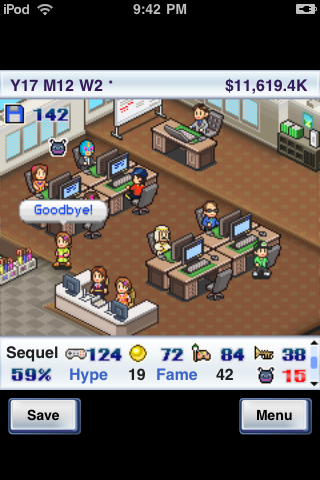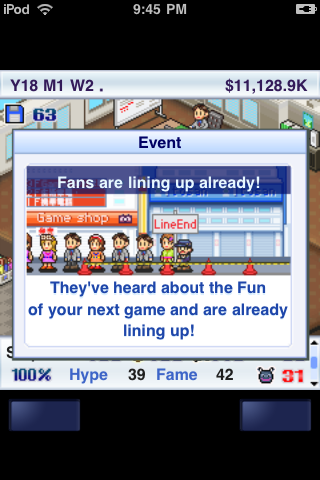Overview
Developed by Kairosoft, Game Dev Story is a simulation-management game in which the player takes charge of a video game development company. As the president, the player must guide their employees--ranging from coders to artists--to produce top-quality and high-grossing games as the company grows from a tiny group to a major and well-known developer.
Gameplay
 A video game in development.
A video game in development.The game starts off with you owning a company of 2 employees. From there, you can select contracts to complete for external clients (e.g. develop a ring tone, game engine, etc.) or create a video game. Contracts vary by difficulty and pay and must be completed within a time frame. If successful, your reputation increases slightly and you get paid. Video games have much higher rates of return but require more time (typically 3 months) and some initial capital investment. As your fame and fortune grows, you can expand to larger offices where you can hire more employees to increase the quality of your games. Throughout the game, more platforms will be released and discontinued, based on real life consoles (such as the Sammy PayStation). Towards the end of the game, the player is also given the opportunity to develop their own console. This can be very expensive and time consuming, and the success of the console rests on how famous the player's company is.
Video Game Development
Video games are the main method of earning money in in Game Dev Story.
Developing a game involves:
- Choosing a platform: If you want to develop games for console, you will have to pay an initial fee for the dev kit as well as a license fee per game. Otherwise, you can develop a PC game but the PC market is far smaller.
- Choose the style and type of game: Some combinations will yield penalties (e.g. Shooter/Reversi) but others will yield bonuses (e.g. Shooter/Robot). Styles and types are unlocked by promoting and training your employees.
- Choose bonuses: You can spend some money upfront to increase the quality, research, speed of development, etc. of the game.
- Choose the direction: You can emphasize various areas like Simplicity, Polish, Approachability, etc. by allocating Direction Points, which are earned throughout the game.
- Choose someone to design the game: This can be an in-house developer or you can contract out for a fee.
Once development commences, your employees will add Fun, Creativity, Graphics and Sound to the game at a rate based on their skill level. The player can increase the skill level of their employees through training, or by increasing their level using points gained through the development and debug process. The player only has a limited time to complete the game, so the higher the skill level of their employee's, the better the game.
At various parts of development, the employee will request an attempt to improve a certain area of the game, this costs money and there is a risk the employee will fail. At the 40% and 80% mark, you can choose someone to design the graphics and sound (respectively) of the game, similar to step 5 for the overall design. If the player uses the same employee to develop certain parts of the game over and over, they will become burnt out and will perform poorly.
 A good game will send fans along in droves.
A good game will send fans along in droves.Once the game reaches 100% development, your team fixes bugs. You can launch the game before the bug-count hits 0, but the quality will suffer. When you ship the game, 4 10-point reviews come in. If you score a cumulative 32 or higher, the game becomes a 'hall of fame' game, and you can later create a sequel to it. However, if the sequel fails to reach the 'hall of fame', the player will lose the ability to develop further sequels. The game is then put on the market for 3 months, sales being determined by the quality of the game, reviews, console market share and whether gaming magazines write articles on the game.
Advertising and Promotion
The player can increase the fame of their company by various means, the most consistent way being advertising. The player can place advertisements in newspapers, all the way to blimp sponsorships and lunar writings. Certain advertisements adhere to different demographics, from 8-12 all the way to 41 and over. As the game progresses, the demographic will age, so the player must make sure he gains fans in as many demographics as possible. Other methods of increasing fame include a yearly video game convention, where the player can choose how much money is spent on their booth, with animal costumes or celebrity appearances. Each year there is also a game awards night, where there are monetary prizes for categories such as best visuals or best sound. The grand prize is $1,000,000, which also brings considerable fame and hype. There is also a $300,000 penalty award given out to the worst game.
Staff Skills and Jobs
Each member of staff has four different skills and a power meter:
- Programming: Used during the development of a game. It gives bonuses to both proposals and game art.
- Scenario: Used when initially creating a game. It mainly contributes to the "Fun" and "Creativity" of a game.
- Graphics: Used at the 40% milestone of a game to decide the initial boost to "Graphics".
- Sound: Used at the 80% milestone of a game to decide the initial boost to "Sound".
- Power Meter: How long it takes the employee to get tired from working or training.
There are eight job titles in total:
- Coder: General worker. Not used during the creation process of a new game, but adds points during development of the game.
- Writer: Can draft the proposal for the game. They mainly rely on their "Scenario" skill.
- Designer: Creates the graphics for the game. Main focus is their "Graphics" skill.
- Sound Engineer: Composes the music in the game. They rely on their "Sound" skill.
- Producer: Well rounded members of the team with an extra bonus when performing production tasks.
- Director: Well rounded members of the team with an extra bonus when performing creative tasks.
- Hardware Engineer: This job is essential if the player wants to create their own console. An employee must have level 5 in all six jobs above to become a Hardware Engineer. As a result these workers end up with huge salaries.
- Hacker: An employee must have level 5 in all the other jobs to become a hacker. Hackers get a bonus to all skills.
Genres and Types
Game Dev Story features a variety of different game genres and types to choose from. The list below is in no way a final list, as there are thousands of different combinations to find.
Genres :
- RPG
- Simulation
- Sim RPG
- Tabletop
- Action
- Adventure
- Shooter
- Action RPG
- Racing
- Trivia
- Life
- Online Sim
- Board Game
- Puzzle
- Music
- Audio Novel
- Motion
- Educational
- Card Game
Types:
- Exploration
- Martial Arts
- Fantasy
- Dungeon
- Romance
- Pirate
- Train
- Animal
- Robot
- Airplane
- Convenience Store
- Historical
- Art
- Game Co.
- Egypt
- Architecture
- Monster
- Hunting
- High School
- War
- Ninja
- Cutie
- Ogre
- Detective
- Mystery
- Cartoon
- Cosplay
- Mushroom
- Poncho
- Chess
- Checkers
- Reversi
- Fitness
- Wrestling
- Snowboard
- Golf
- Swimming
- Volleyball
- Soccer
- Baseball
- Marathon
- F1 Racing
- Pinball
- Dating
- Spy
- Harbor
- Basketball
Game Console Spoofs
Game Dev Story lets the player develop games on various game consoles throughout the history of gaming. These consoles are based off of the real life consoles such as the NES, Genesis, Saturn, PlayStation, and even the Wii. Below is the list of each console in the game, with its obvious influence listed in parentheses.
 Sonny Announcing the PlayStatus 2
Sonny Announcing the PlayStatus 2Consoles By Company:
Intrendo (Nintendo)
Karoisoft (Custom)
Microx (Microsoft)
Nipon (Bandai/NEC/SNK)
Senga (Sega)
Sonny (Sony)
- PlayStatus (PS1)
- PlayStatus 2 (PS2)
- Mini Status (PSP)
No Affiliation
Custom Console Development
Late in the career mode, the player is given the opportunity to develop a custom console. The time that the console spends in development, and the cost to make the console is dependent on the parts used. Below is a list of parts used to make a custom console. Note that the player must have at least one Hardware engineer in order to make a console.
Form Factor: Portable (4,000K), Console (6,000K)
CPU: 16-bit Chip (1,000K), 32-bit Chip (10,000K), 64-bit Chip (50,000K)
Media: Cartridge (3,000K), CD-Rom (5,000K), DVD-Rom (15,000K), BD-Rom (35,000K)
It's also worth noting that the player can only have one console on the market at the same time, so as soon as the player's second console releases, the first is discontinued. Prices of development can range from 8,000K up to as much as 91,000K, not including employee salaries.
Gamedex
Gamedex is Game Dev Story's version of E3. Every year during the first week of the 7th month the player is asked whether or not they wish to participate. If the player chooses to participate they can spend 150K on hiring no staff to man the booth, 600K to hire people in bear costumes, 2.500K to hire booth babes, or 7,000K to hire a guest star to be at the players booth. The people at your booth have varying levels of effectiveness, with the guest star obviously being the most effective at getting attendees to your booth.
Showing up at Gamedex has its benefits. Increased sales from any game currently on the market is the main benefit of attending Gamedex. It is important however to budget how much the company is spending on attractions with how many sales will be added due to Gamedex.
Log in to comment